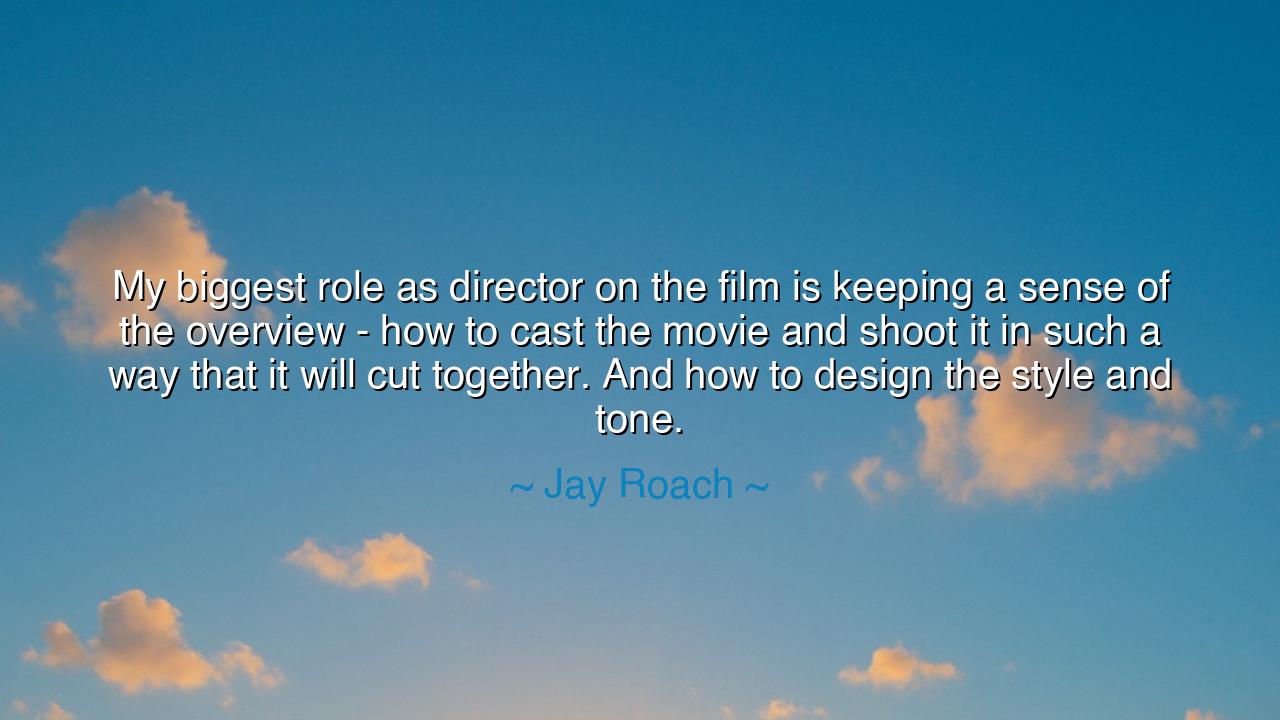
My biggest role as director on the film is keeping a sense of the
My biggest role as director on the film is keeping a sense of the overview - how to cast the movie and shoot it in such a way that it will cut together. And how to design the style and tone.






“My biggest role as director on the film is keeping a sense of the overview – how to cast the movie and shoot it in such a way that it will cut together. And how to design the style and tone.” Thus spoke Jay Roach, a craftsman of stories and conductor of visions, whose words unveil the hidden discipline that underlies all great creation. In this reflection, Roach reminds us that art, though born of imagination, demands vision, harmony, and design—that every masterpiece depends upon the wisdom to see not only the parts, but the whole.
The ancients would have understood his wisdom well. For the director, like the philosopher-king, must hold the overview, the grand design that binds together the chaos of many elements into unity. The sculptor sees the form within the marble; the general sees victory before the first battle is fought; the poet feels the rhythm before the words are born. So too must the director, amid the noise of production and the pressure of time, hold in his mind the entire tapestry—the actors, the light, the dialogue, the pacing, and the tone that gives it all soul. For without such vision, even the most beautiful fragments remain fragments still.
Jay Roach’s insight speaks not only to the art of cinema, but to the art of leadership itself. To keep the overview is to stand above the confusion of moments, to see how each small act contributes to the final truth. Many creators, overwhelmed by detail, lose sight of the whole; many leaders, caught in urgency, forget purpose. But Roach reminds us that true creation demands perspective. A film, like a life, is not made from isolated scenes—it is made from how those scenes connect, how the light of one moment spills into the shadow of another. The master’s task is to see the connection when others see only the chaos.
Consider the example of Leonardo da Vinci, who, when painting The Last Supper, did not merely render faces and gestures, but wove every brushstroke into a symphony of meaning. The angles of the table, the placement of the apostles, the light through the window—all served the greater design. He understood, as Roach does, that greatness lies not in the beauty of the parts, but in the harmony of the whole. Each figure was necessary, but only the composition made it immortal.
Likewise, in filmmaking, the director must be both architect and alchemist—one who designs structure and transforms emotion. Casting the film, as Roach says, is not simply choosing actors, but choosing voices of truth—souls who will carry the essence of the story. Shooting the film is not merely recording images, but capturing rhythm, balance, and energy so that when the film “cuts together,” it feels inevitable, as if it could never have been otherwise. The style and tone, then, become the spirit of the work—the unseen thread that unites laughter, sorrow, beauty, and silence into a living thing.
But this wisdom reaches beyond the walls of cinema. Every human life, in its own way, is a film in progress. Each day is a scene; each choice, a line of dialogue; each challenge, a cut between acts. To live wisely, one must do as Roach does—hold the overview. Do not dwell endlessly on a single mistake or triumph; see how each moment fits within the larger story you are telling with your life. Ask yourself: What is the tone of my story? What design am I creating with my days? For only those who live with purpose can edit the fragments of existence into something meaningful and whole.
So let this teaching be passed down: be both the maker and the witness of your creation. In your art, your work, your life—hold fast to the overview. Know your purpose before you begin, and let every decision serve that design. When the moment feels chaotic, remember that even great films are built from hundreds of imperfect takes, united by vision.
For as Jay Roach reminds us, mastery lies not in control of every detail, but in the understanding of how the details fit together. The wise creator sees not merely what is before him, but what it will become. Whether you craft films, forge businesses, raise families, or write destinies—keep the overview, guide the tone, and honor the design. For in doing so, you will not merely create—you will compose eternity.






AAdministratorAdministrator
Welcome, honored guests. Please leave a comment, we will respond soon